NGC XF Alexander III ancient greek silver coins AR Tetradrachm 336-323 BC MAX029
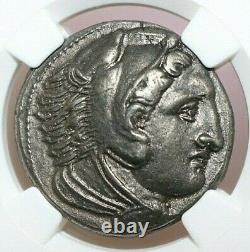
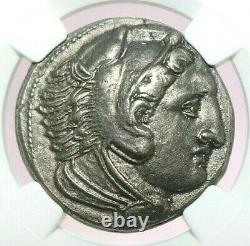
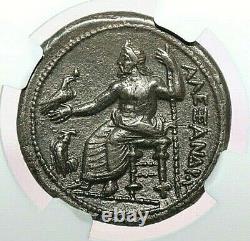
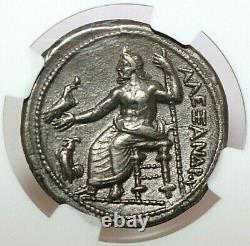
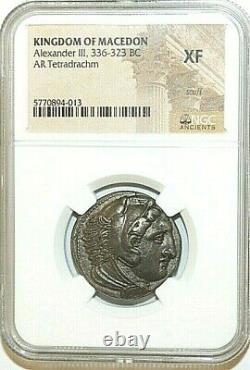
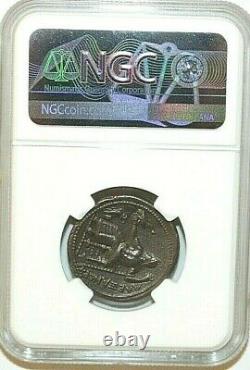

See my other items here. ATTENTION: Dear Customers, you will receive exactly the same item which you see on the pictures, not similar or other. Please read the description carefully and review the photos.
This article is about the ancient king of Macedonia. For other uses, see Alexander the Great (disambiguation). , ancient Roman floor mosaic from the House of the Faun. Showing Alexander fighting king Darius III of Persia.
In the Battle of Issus. 20 or 21 July 356 BC Pella. 10 or 11 June 323 BC (aged 32) Babylon. Alexander III of Macedon Greek. III ho Makedn ; 20/21 July 356 BC 10/11 June 323 BC, commonly known as Alexander the Great Greek.Ho Mégas , was a king basileus. And a member of the Argead dynasty. He was born in Pella. In 356 BC and succeeded his father Philip II. To the throne at the age of 20.
He spent most of his ruling years on an unprecedented military campaign. And northeast Africa, and by the age of thirty, he had created one of the largest empires. Of the ancient world, stretching from Greece.
He was undefeated in battle and is widely considered one of history's most successful military commanders. During his youth, Alexander was tutored by Aristotle. After Philip's assassination in 336 BC, he succeeded his father to the throne and inherited a strong kingdom and an experienced army. Alexander was awarded the generalship of Greece. And used this authority to launch his father's pan-Hellenic project to lead the Greeks in the conquest of Persia.
In 334 BC, he invaded the Achaemenid Empire. (Persian Empire) and began a series of campaigns. Following the conquest of Anatolia.
Alexander broke the power of Persia in a series of decisive battles, most notably the battles of Issus. He subsequently overthrew Persian King Darius III. And conquered the Achaemenid Empire in its entirety. At that point, his empire stretched from the Adriatic Sea. Alexander endeavoured to reach the "ends of the world and the Great Outer Sea" and invaded India.
In 326 BC, winning an important victory over the Pauravas. At the Battle of the Hydaspes. He eventually turned back at the demand of his homesick troops, dying in Babylon. In 323 BC, the city that he planned to establish as his capital, without executing a series of planned campaigns that would have begun with an invasion of Arabia.
In the years following his death. A series of civil wars. Tore his empire apart, resulting in the establishment of several states ruled by the Diadochi. Alexander's surviving generals and heirs. Alexander's legacy includes the cultural diffusion.
Which his conquests engendered, such as Greco-Buddhism. He founded some twenty cities that bore his name. Alexander's settlement of Greek colonists and the resulting spread of Greek culture. In the east resulted in a new Hellenistic civilization. Aspects of which were still evident in the traditions of the Byzantine Empire.
In the mid-15th century AD and the presence of Greek speakers in central. Alexander became legendary as a classical hero.
In the mould of Achilles. And he features prominently in the history and mythic traditions of both Greek and non-Greek cultures. He was undefeated in battle and became the measure against which military leaders compared themselves.
Throughout the world still teach his tactics. He is often ranked among the most influential people in history. Bust of a young Alexander the Great from the Hellenistic era.
Tutoring Alexander , by Jean Leon Gerome Ferris. Alexander was born in Pella. The capital of the Kingdom of Macedon. On the sixth day of the ancient Greek month of Hekatombaion. Which probably corresponds to 20 July 356 BC, although the exact date is uncertain. He was the son of the king of Macedon, Philip II. And his fourth wife, Olympias. The daughter of Neoptolemus I. Although Philip had seven or eight wives, Olympias was his principal wife for some time, likely because she gave birth to Alexander.Several legends surround Alexander's birth and childhood. According to the ancient Greek biographer Plutarch. On the eve of the consummation of her marriage to Philip, Olympias dreamed that her womb was struck by a thunderbolt that caused a flame to spread "far and wide" before dying away. Sometime after the wedding, Philip is said to have seen himself, in a dream, securing his wife's womb with a seal.
Engraved with a lion's image. Plutarch offered a variety of interpretations of these dreams: that Olympias was pregnant before her marriage, indicated by the sealing of her womb; or that Alexander's father was Zeus.
Ancient commentators were divided about whether the ambitious Olympias promulgated the story of Alexander's divine parentage, variously claiming that she had told Alexander, or that she dismissed the suggestion as impious. On the day Alexander was born, Philip was preparing a siege. On the city of Potidea.
On the peninsula of Chalcidice. That same day, Philip received news that his general Parmenion. Had defeated the combined Illyrian.
Armies and that his horses had won at the Olympic Games. It was also said that on this day, the Temple of Artemis. One of the Seven Wonders of the World. This led Hegesias of Magnesia. To say that it had burnt down because Artemis. Was away, attending the birth of Alexander. Such legends may have emerged when Alexander was king, and possibly at his instigation, to show that he was superhuman and destined for greatness from conception. In his early years, Alexander was raised by a nurse, Lanike.Sister of Alexander's future general Cleitus the Black. Later in his childhood, Alexander was tutored by the strict Leonidas.
A relative of his mother, and by Lysimachus of Acarnania. Alexander was raised in the manner of noble Macedonian youths, learning to read, play the lyre. Statue of Alexander the Great in Thessaloniki. When Alexander was ten years old, a trader from Thessaly. Brought Philip a horse, which he offered to sell for thirteen talents.
The horse refused to be mounted, and Philip ordered it away. Alexander, however, detecting the horse's fear of its own shadow, asked to tame the horse, which he eventually managed. Plutarch stated that Philip, overjoyed at this display of courage and ambition, kissed his son tearfully, declaring: My boy, you must find a kingdom big enough for your ambitions. Macedon is too small for you, and bought the horse for him. Bucephalas carried Alexander as far as India. When the animal died (because of old age, according to Plutarch, at age thirty), Alexander named a city after him, Bucephala. When Alexander was 13, Philip began to search for a tutor.And considered such academics as Isocrates. The latter offering to resign from his stewardship of the Academy. To take up the post. In the end, Philip chose Aristotle. And provided the Temple of the Nymphs at Mieza.
In return for teaching Alexander, Philip agreed to rebuild Aristotle's hometown of Stageira. Mieza was like a boarding school for Alexander and the children of Macedonian nobles, such as Ptolemy. Many of these students would become his friends and future generals, and are often known as the'Companions'. Aristotle taught Alexander and his companions about medicine, philosophy, morals, religion, logic, and art. Under Aristotle's tutelage, Alexander developed a passion for the works of Homer.
And in particular the Iliad. Aristotle gave him an annotated copy, which Alexander later carried on his campaigns. During his youth, Alexander was also acquainted with Persian exiles at the Macedonian court, who received the protection of Philip II for several years as they opposed Artaxerxes III. Among them were Artabazos II.
Future mistress of Alexander, who resided at the Macedonian court from 352 to 342 BC, as well as Amminapes. Of Alexander, or a Persian nobleman named Sisines. This gave the Macedonian court a good knowledge of Persian issues, and may even have influenced some of the innovations in the management of the Macedonian state.Writes that, also, Anaximenes of Lampsacus. Was one of his teachers. Anaximenes, also accompanied him on his campaigns. Battle of the Uxian Defile.
Battle of the Persian Gate. Siege of the Sogdian Rock. May 327 March 326 BC.
November 326 February 325 BC. Main article: Alexander the Great in legend.
Legendary accounts surround the life of Alexander the Great, many deriving from his own lifetime, probably encouraged by Alexander himself. His court historian Callisthenes portrayed the sea in Cilicia. As drawing back from him in proskynesis. Writing shortly after Alexander's death, another participant, Onesicritus.Queen of the mythical Amazons. When Onesicritus read this passage to his patron, Alexander's general and later King Lysimachus. Reportedly quipped, I wonder where I was at the time. In the first centuries after Alexander's death, probably in Alexandria, a quantity of the legendary material coalesced into a text known as the Alexander Romance.
Later falsely ascribed to Callisthenes and therefore known as Pseudo-Callisthenes. This text underwent numerous expansions and revisions throughout Antiquity and the Middle Ages. Containing many dubious stories, and was translated into numerous languages. In ancient and modern culture.
Main articles: Cultural depictions of Alexander the Great. And Alexander the Great in the Quran. Alexander the Great depicted in a 14th-century Byzantine manuscript.Alexander the Great's accomplishments and legacy have been depicted in many cultures. Alexander has figured in both high and popular culture beginning in his own era to the present day.
The Alexander Romance , in particular, has had a significant impact on portrayals of Alexander in later cultures, from Persian to medieval European to modern Greek. Alexander features prominently in modern Greek folklore, more so than any other ancient figure. The colloquial form of his name in modern Greek ("O Megalexandros") is a household name, and he is the only ancient hero to appear in the Karagiozis. One well-known fable among Greek seamen involves a solitary mermaid.
" The correct answer is "He is alive and well and rules the world! Causing the mermaid to vanish and the sea to calm. Any other answer would cause the mermaid to turn into a raging Gorgon. Alexander the Great depicted in a 14th-century Armenian miniature painting. Detail of a 16th-century Islamic painting.
Depicting Alexander the Great being lowered in a glass submersible. Alexander the Great conquering the air. Les faits et conquêtes d'Alexandre le Grand , Flanders.
Literature, Alexander is referred to by the epithet gujastak , meaning "accursed", and is accused of destroying temples and burning the sacred texts of Zoroastrianism. In Sunni Islamic Persia, under the influence of the Alexander Romance. , a more positive portrayal of Alexander emerges.("The Book of Kings") includes Alexander in a line of legitimate Persian shahs. A mythical figure who explored the far reaches of the world in search of the Fountain of Youth.
Later Persian writers associate him with philosophy, portraying him at a symposium with figures such as Socrates. And Aristotle, in search of immortality. (literally "the Two-Horned One") mentioned in the Quran. Is believed by scholars to be based on later legends of Alexander.
In this tradition, he was a heroic figure who built a wall to defend against the nations of Gog and Magog. He then travelled the known world in search of the Water of Life and Immortality, eventually becoming a prophet.
Version of the Alexander Romance portrays him as an ideal Christian world conqueror who prayed to "the one true God". In Egypt, Alexander was portrayed as the son of Nectanebo II. His defeat of Darius was depicted as Egypt's salvation, "proving" Egypt was still ruled by an Egyptian. Alexander was shown the Book of Daniel.
When he entered Jerusalem, which described a mighty Greek king who would conquer the Persian Empire. This is cited as a reason for sparing Jerusalem. The name "Sikandar", derived from the Persian name for Alexander, denotes a rising young talent, and the Delhi Sultanate ruler Aladdin Khajli. Stylized himself as "Sikandar-i-Sani" (the Second Alexander the Great). Turkic and Afghan sovereigns from the Iranian-cultured region of Central Asia brought positive cultural connotations of Alexander to the Indian subcontinent, resulting in the efflorescence of Sikandernameh Alexander Romances.
Written by Indo-Persian poets such as Amir Khusrow. And the prominence of Alexander the Great as a popular subject in Mughal-era Persian miniatures. Alexander the Great was revered as a member of the Nine Worthies.
A group of heroes whose lives were believed to encapsulate all the ideal qualities of chivalry. There are poems referring to Alexander.
Irish playwright Aubrey Thomas de Vere. Wrote Alexander the Great, a Dramatic Poem. In popular culture, the British heavy metal band Iron Maiden. Included a song titled "Alexander the Great" on their 1986 album Somewhere in Time. Written by bass player Steve Harris.The song retells Alexander's life. The item "NGC XF Alexander III ancient greek silver coins AR Tetradrachm 336-323 BC MAX029" is in sale since Friday, November 20, 2020. This item is in the category "Coins & Paper Money\Coins\ Ancient\Greek (450 BC-100 AD)".
bean_medals" and is located in Riga, centrs. This item can be shipped worldwide.- Country/Region of Manufacture: Greece
- Certification Number: 5770894-013
- Certification: NGC
- Date: 336 - 323 BC
- Grade: XF
- Year: 412 BC
- Composition: Silver
- Historical Period: Greek (450 BC-100 AD)
- Denomination: Tetradrachm
- Era: Ancient

